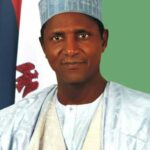
Former Minister of Transportation, Rotimi Amaechi, has urged Nigerian leaders and stakeholders to take urgent steps to address what he described as rising injustice, economic hardship, insecurity, and widening social inequality across the country.
Amaechi spoke in a video published by SYMFONI TV on Saturday, November 22, 2025, during an engagement with the Arewa Consultative Forum (ACF), where he delivered a frank assessment of the state of the nation.
Amaechi, who served in the administration of former President Muhammadu Buhari, began by acknowledging the gesture of recognition extended to him by northern leaders.
In his words, “I will not take 2 minutes. I’m a politician. Politicians fly their trade by by words. Let me start by thanking all of you members of ACF and the leadership of ACF for the honor and privilege of inviting me and the honor of even recognizing my relationship with you…”
He noted that the development projects executed in the North during his tenure were not personal favors but part of national service performed in his official capacity as a federal minister.
He listed several major transportation infrastructure projects that he said significantly benefited the northern region.
According to him, “…whatever I have done in the north, I did as a minister of the Federal Republic of Nigeria. It includes the Kano-Kaduna rail, the Kano-Maradi rail and the completion of the Abuja-Kaduna rail..”
Amaechi stressed that while leaders often advocate unity within different regions, the country’s challenges can only be solved through a collective national mindset that treats all regions fairly.
He argued that unity must not be selective or limited to internal regional solidarity.
He warned that Nigeria’s persistent challenges are rooted in structural injustice and unequal treatment of different parts of the federation.
He stated, “We are a nation. While preaching unity in northern Nigeria, please let us also so preach unity in the whole of Nigeria. The problem with Nigeria is injustice. The justice that is being served in Abuja must be served in the Igbo land southeast, must also be served in the north as well as the southwest and as well as the south south.”
While reacting to criticisms directed at President Bola Tinubu, including allegations of nepotism, Amaechi defended the president but argued that the broader problem is that the government is benefiting only a small circle while the majority of Nigerians struggle.
He said, “Those who have accused the president of being nepostic are not being fair to him. He’s not nepostic. The Yorubas are not enjoying this government. Very few individuals are enjoying this government and rest of us are sufferings. The rest of us are dying of hunger. Nigerians are dying of hunger.”
Amaechi also condemned recent decisions by the government to close schools due to growing insecurity.
According to him, the measure is counterproductive and worsens the already alarming number of children without access to formal education.
He warned that the decision risks pushing millions more into social vulnerability, noting, “The government has panicked. They closed schools. There are 20 million Nigerians who are out of school. Instead of addressing it, we are closing schools to increase the number of Nigerians who are out of school.
”In that number more than 60% of those who are out of school are northerners and the Nigerian government are not worried.”
The former minister expressed concern that denying citizens legitimate socio-economic opportunities will inevitably push many toward criminal activity.
He explained, “The more we deny Nigerians their economic rights, the more they will establish for themselves, non-economic rights. And what do I mean by non-economic rights? Those rights that includes kidnapping.”
He further lamented the deteriorating state of security across the country, declaring that the government appears overwhelmed and unable to provide protection.
He stated, “Today the Nigerian government is not able to protect anybody. Nobody.”
Amaechi urged northern leaders, especially the Arewa Consultative Forum, to assume a proactive role in encouraging national consensus-building among different regional and political interests.
He argued that dialogue and collective engagement are necessary to tackle Nigeria’s rising insecurity, hunger, and public frustration.
He called for collaboration and national responsibility, saying, “So for me I thank Arewa and I think that Arewa should go a bit further to negotiate with other Nigerians to come together to address what is currently happening in the country. I thank all of you. God bless all of you.
If you love political news or like to get more news happening around the globe, use the button below to get more verified news happening around Nigeria and the world today.








Leave a Reply